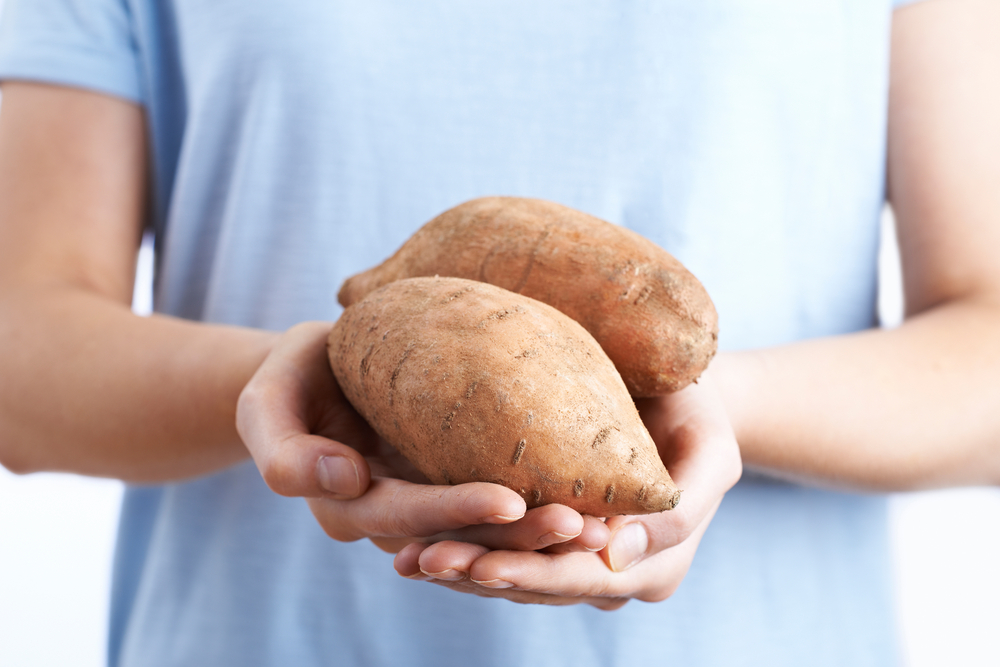
Sweet potato, the root vegetable once used to feed the poor in the early 20th century, is back in fashion, which is good news as it is one of the world’s best superfoods and contains a bunch of nutrients you can’t go past for health benefits.
Here at The Brasserie we are producing our own crop for the Restaurant menu, complete with sweet potato leaves that are extremely nutritional and tasty in their own right. See this week’s Today’s Harvest post on our Facebook page for growing tips.
Antioxidants found in food are natural anti-inflammatory agents, and sweet potatoes are full of them! Vitamins from the B family in abundance, like C and A, sweet potatoes are also a good source of choline, which is usually mostly found in meat and eggs. Choline is very important to tame inflammation, but it is also beneficial for a good nights sleep, learning and memory and muscle movement. When you gain antioxidants from natural sources, like nutritious food, they work better in your body than when you take supplements because they are balanced with other nutrients.
The recommended daily dose of potassium is 4,700mg. Sweet potatoes are one of the highest vegetable sources of potassium, containing almost 500mg. Potassium is needed by the body to help nerves and muscles communicate to each other, preventing muscle cramps and contractions, and it helps transport nutrient into the cells and waste products out of them. Potassium is also important to offset the damage sodium has on blood pressure and helps to protect and to regulate the workings of the kidneys.
Vitamin C is one of the most beneficial vitamins around. It’s versatile benefits work on many areas of the body and the health system. Also known as ascorbic acid, vitamin c is naturally found in vegetables and fruits and is hugely beneficial for things like heart disease, protection against free radicals in the body, the absorption of iron and reducing cholesterol levels.
A deficiency of vitamin A can cause deterioration to the outer parts of the eye’s photoreceptors, which can damage vision. Vitamin A and vitamin E, which is also found in sweet potatoes, are wonderful for eye health and may prevent eye problems in the aging process and other degenerative damage.
Magnesium is very important for various functions of the body. It helps nerve function, regulates blood pressure, controls blood sugar; it is a neurotransmitter release, it energises the metabolism and is good for protein synthesis. Many people will be deficient in magnesium but never know it, as it does not show up on any blood test. This is because magnesium is stored in your bones, not in the blood. Sweet potatoes do not have the largest source of magnesium compared to spinach and pumpkin seeds, but they still pack a punch of magnesium benefits for the system.
A low glycemic index is not only important to people living with diabetes, but to those considered on the ‘normal’ blood sugar scale too. White potatoes have a high glycemic index, which means they have a high carbohydrate level, which converts into sugar and then corresponds to elevated blood sugar levels. In comparison, sweet potatoes are low on the glycemic index, which helps control diabetes and sugar crashes. Eating regular small amounts can help our bodies to maintain healthy blood sugar levels for people both with and without diabetes. This also helps to balance energy, fatigue and weight gain.
Beta-carotene is the orange-red pigment that is found in plants, fruits, and vegetables, especially colorful vegetables, such as sweet potato. This is a fat-soluble plant pigment. It is important to eat foods containing beta-carotene because the body converts it into Vitamin A. This means beta-carotene is not an essential nutrient, but vitamin A is. What is extraordinary about our systems is that the human body will only convert as much vitamin A as it needs to function properly. However, it needs the beta-carotene first to do so. Sweet potatoes have the highest count of beta-carotene amongst all other fruits and vegetables.
Containing absolutely zero amount of fat makes these vegetables a great food, not for weight loss alone, but they contain large amounts of fibre. Fibre is important for the digestive system and the process of foods through the body. For women, the daily intake of fibre per day is recommended at 21-25 grams for women, and 30-38 for men. The most fibre in sweet potatoes is found in the skin, up to six grams. So consider leaving the skin on next time you add sweet potatoes to a dish.
The best form of folate is folic acid, otherwise known as B9. Folate is often taken as a supplement but is also found in many foods. Folic acid is good for everyone for the growth of cells in the body. It is even more important for pregnant women in regards to the development of the fetus.
Eating sweet potatoes encourages glowing, healthy skin and collagen growth. Carotenoid rich vegetables, such as carrots, spinach, and sweet potatoes can help your skin to glow. Vegetables such as these increase the red and yellow tones in the skin, which visibly brighten complexions. You need to consume extra amounts of beta-carotene vegetables every day for around six weeks. The beta-carotene in sweet potato also combats the body’s free radicals, which encourage the aging process. So to preserve your skin and stop the aging process, consume more sweet potatoes!


